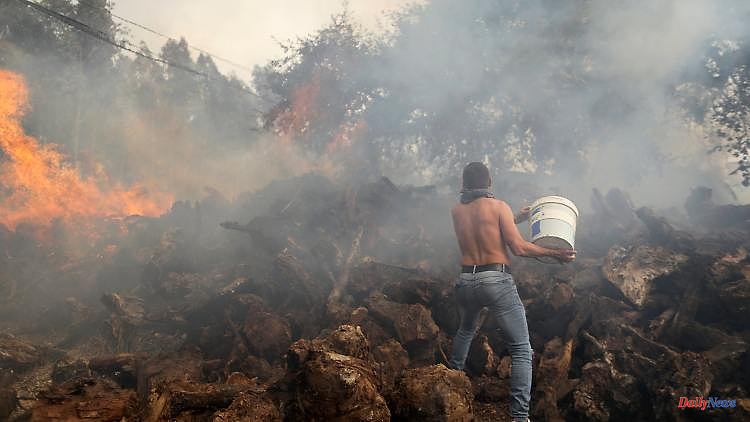Large parts of southern Europe have been sweating for days with high temperatures and blazing sunshine. In France, the fire brigade is fighting huge forest fires, in Italy the harvest is withering in the fields. In Spain and Portugal there is hope for relaxation, but the heat wave is now rolling towards Germany and Great Britain.
So far, Germany has been spared the sweltering heat that has been spreading in southern Europe for days. With the beginning of the week, people in this country also have to get used to sweating. On Tuesday, temperatures above 35 degrees will be reached, in the west up to 40 degrees, as reported by the German Weather Service. In view of the expected weather conditions, the Marburger Bund doctors' association is calling for a national heat protection plan so that senior citizens' facilities or hospitals can better prepare for heat waves, as well as an information campaign.
It is also expected to remain hot in large parts of southern Europe. The highest heat warning level applies in western France, Italy expects another heat wave. In Portugal and Spain, on the other hand, the situation could slowly ease.
In addition to Germany, the high temperatures are now also approaching Great Britain, where for the first time ever there is a red weather warning for Monday and Tuesday due to heat. Up to 40 degrees are expected in large parts of England. The temperature record so far is 38.7 degrees. The government had declared a disaster because of the expected heat record.
France has also called on people in the country to be particularly careful in view of the expected rise in temperatures. The weather service Météo France imposed the highest red warning level for almost the entire French Atlantic coast and other western areas until Monday afternoon. Temperature records are almost certainly to be broken here.
With the persistent dry heat and strong winds, the fierce fight against two large forest fires continues south of Bordeaux. The situation worsened on Sunday afternoon. The fire at Teste-de-Buch reached the sea and blazed south from there. Changing winds caused the forest fire at Landiras to grow. So far, almost 13,000 hectares of land in the area have been burned. More than 16,000 people had to leave their homes for safety.
In addition to forest fires that flare up again and again, Italy is also suffering from the lack of rain. The farmers' association Coldiretti warned on Sunday of crop losses of up to 70 percent in some areas. Fruit and vegetables are burning in the fields, it said in a statement. Varieties from peppers to melons, apricots, tomatoes and eggplants are affected. In Sicily and Sardinia, the authorities again raised the forest fire warning levels in some parts of the islands. In Sicily, the highest level three already applies locally.
The Greek fire brigade also continues to assess the risk of forest fires in many parts of the country as "very high". On Monday, the Attica region with the capital Athens as well as the islands of Euboea, Crete, Lesbos and Samos and the north-east of the Peloponnese peninsula were particularly affected. The sometimes strong winds that blow in the Aegean Sea cause difficulties - they can heat up and drive an almost suffocated fire in no time at all.
About 30 forest fires were still active in Spain on Sunday evening. The fires have leveled tens of thousands of hectares in the past few days, as reported by the state television broadcaster RTVE, citing the various regional authorities. In Portugal, meanwhile, around a thousand emergency services were fighting 16 active forest fires on Sunday evening. According to the nature conservation authority ICNF, the flames in Portugal destroyed around 30,000 hectares of forest in just over a week.
In both countries on the Iberian peninsula, meanwhile, there was reason for hope in anticipation of falling temperatures. In Portugal, the government therefore did not want to extend the "Estado de contingência", the third highest state of emergency, which expires on Monday, after a week. "In the coming days, a drop in temperature of between two and eight degrees is expected," said Interior Minister José Luis Carneiro. In Spain, the heat wave that has swept through practically the entire country for nine days will end between Monday and Tuesday, the national weather service Aemet said.












